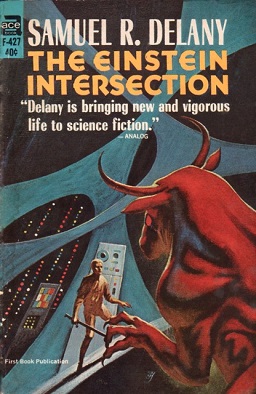 The Einstein Intersection by Samuel R. Delany
The Einstein Intersection by Samuel R. Delany
Read in May 2009
Warning: Spoilers
This is the strangest science fiction story I have ever read! I spent most of the journey completely confused. Pieces of the puzzles fell into place as Lobey reached his destination through death, resurrection and rebirth.
Told by the descendants of aliens who occupied an abandoned Earth, I slowly discovered the current tenants tried to revive and relive human genetics and history (or mythology in most cases) to the detriment of their own future. A revolution roils beneath the surface between those who maintain the original mission and those who want to break free of humanity’s death throes to forge a new frontier.
The explanation for the arrival of the aliens is the crux of the title The Einstein Intersection:
“(T)wo mathematicians between them ended an age and began another for our hosts, the ghosts called Man. One was Einstein, who with his Theory of Relativity defined the limits of man’s perception by expressing mathematically just how far the condition of the observer influences the thing he perceives. … The other was Gödel, a contemporary of Einstein, who was the first to bring back a mathematically precise statement about the vaster realm beyond the limits Einstein had defined: In any classical mathematical system, there are an infinite number of true theorems which, though contained in the original system, cannot be deduced from it. … The visible effects of the Einstein theory leaped up on a convex curve, its productions huge in the first century after its discovery, then leveling off. The productions of Gödel’s law crept up on a concave curve, microscopic at first, then leaping to equal the Einstein curve, cross it, outstrip it. At the point of intersection, humanity was able to reach the limits of the known universe with ships and projection forces that are still available to anyone who wants to use them … and when Gödel’s law eagled over Einstein’s, its shadow fell on a deserted Earth. {emphasis added}
I read this novel to compare it to the other Hugo winners/nominee’s from 1968. I followed Lord of Light (the Hugo winner) with this one. I’m beginning to wonder if there was something strange in the water back in 1968 … perhaps Lucy in the Sky with Diamonds?

Yes, it’s called “New Wave Sci-Fi.” Characterized by playing with myth, attempting to be more literary than early sci-fi, stylistically experimental, use of metafiction, etc….. Simply a brilliant work.